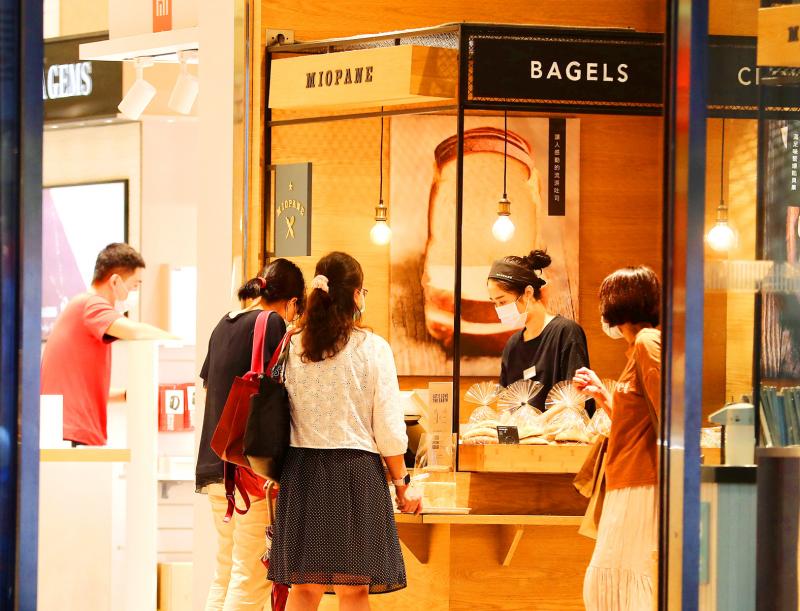The government’s business climate monitor last month showed “yellow-blue” for the fifth straight month, with the domestic economy stalled amid the COVID-19 pandemic, although it is starting to show signs of improvement, the National Development Council (NDC) said yesterday.
“Though the gauge continued to point to a slowdown, the total score gained 2 points, rising to 21 from 19, suggesting that the economy is improving,” council research director Wu Ming-huei (吳明蕙) told a media briefing in Taipei.
The council uses a five-color spectrum to portray the nation’s economic landscape, with “green” indicating steady growth, “red” suggesting overheating and “blue” signaling a recession. Dual colors indicate a transition.

Photo: CNA
Component measures of the TAIEX, and imports of machinery and electrical equipment improved, while the reading on industrial production dropped, the council said.
The remaining five subindices were steady, it said.
Imports of capital equipment rose 13.2 percent year-on-year last month to US$4.07 billion as local semiconductor firms sought to upgrade their technologies to meet demand, government data showed.
Taiwan Semiconductor Manufacturing Co (TSMC, 台積電) on July 16 increased its planned capital expenditure this year by US$1 billion, citing demand from 5G infrastructure deployment and high-performance computing applications.
TSMC, the world’s largest contract chip maker whose customers include Apple Inc, Advanced Micro Devices Inc, Qualcomm Inc and Nvidia Corp, has purchased four plots of land in Taiwan so far this year to accommodate new facilities.
The index of leading indicators, which predicts the economic situation for the following six months, increased 1.23 percent to 102.39, its third straight month of gains, on the back of improved export orders, business sentiment and labor accession rates, the council said.
However, the pickup is not even or fast enough to suggest a recovery, Wu said, adding that business at non-tech firms remained sluggish.
It would be safer to bet on a recovery when the cumulative improvement exceeds 5 percent, remains so for five straight months and encompasses most sectors, she said.
The index of coincident indicators, which reflects the current economic situation, weakened 0.1 percent to 98.79, weighed by unfavorable non-farm payrolls, overall power consumption and industrial output, the council said.
Until the global pandemic stabilizes, uncertainty would continue to disrupt life and haunt manufacturing and business activity, Wu said.

KEEPING UP: The acquisition of a cleanroom in Taiwan would enable Micron to increase production in a market where demand continues to outpace supply, a Micron official said Micron Technology Inc has signed a letter of intent to buy a fabrication site in Taiwan from Powerchip Semiconductor Manufacturing Corp (力積電) for US$1.8 billion to expand its production of memory chips. Micron would take control of the P5 site in Miaoli County’s Tongluo Township (銅鑼) and plans to ramp up DRAM production in phases after the transaction closes in the second quarter, the company said in a statement on Saturday. The acquisition includes an existing 12 inch fab cleanroom of 27,871m2 and would further position Micron to address growing global demand for memory solutions, the company said. Micron expects the transaction to

Nvidia Corp’s GB300 platform is expected to account for 70 to 80 percent of global artificial intelligence (AI) server rack shipments this year, while adoption of its next-generation Vera Rubin 200 platform is to gradually gain momentum after the third quarter of the year, TrendForce Corp (集邦科技) said. Servers based on Nvidia’s GB300 chips entered mass production last quarter and they are expected to become the mainstay models for Taiwanese server manufacturers this year, Trendforce analyst Frank Kung (龔明德) said in an interview. This year is expected to be a breakout year for AI servers based on a variety of chips, as

Global semiconductor stocks advanced yesterday, as comments by Nvidia Corp chief executive officer Jensen Huang (黃仁勳) at Davos, Switzerland, helped reinforce investor enthusiasm for artificial intelligence (AI). Samsung Electronics Co gained as much as 5 percent to an all-time high, helping drive South Korea’s benchmark KOSPI above 5,000 for the first time. That came after the Philadelphia Semiconductor Index rose more than 3 percent to a fresh record on Wednesday, with a boost from Nvidia. The gains came amid broad risk-on trade after US President Donald Trump withdrew his threat of tariffs on some European nations over backing for Greenland. Huang further

HSBC Bank Taiwan Ltd (匯豐台灣商銀) and the Taiwan High Prosecutors Office recently signed a memorandum of understanding (MOU) to enhance cooperation on the suspicious transaction analysis mechanism. This landmark agreement makes HSBC the first foreign bank in Taiwan to establish such a partnership with the High Prosecutors Office, underscoring its commitment to active anti-fraud initiatives, financial inclusion, and the “Treating Customers Fairly” principle. Through this deep public-private collaboration, both parties aim to co-create a secure financial ecosystem via early warning detection and precise fraud prevention technologies. At the signing ceremony, HSBC Taiwan CEO and head of banking Adam Chen (陳志堅)